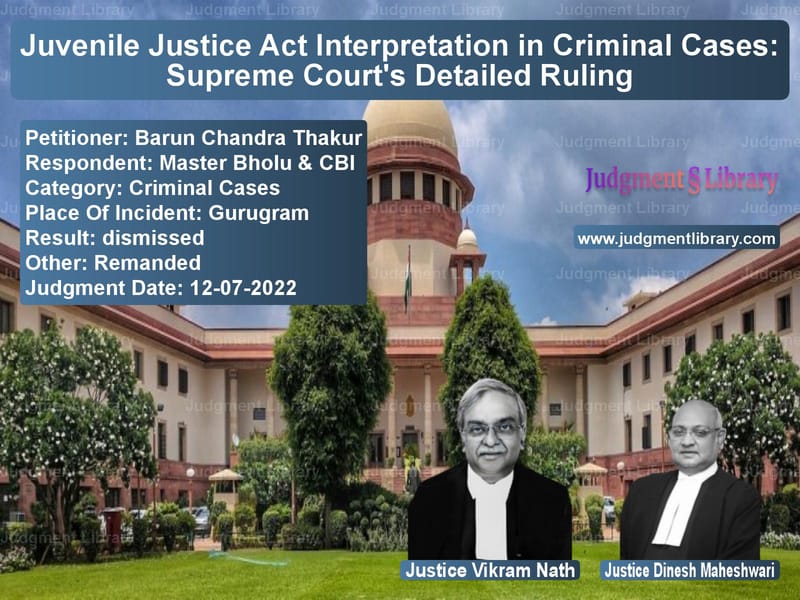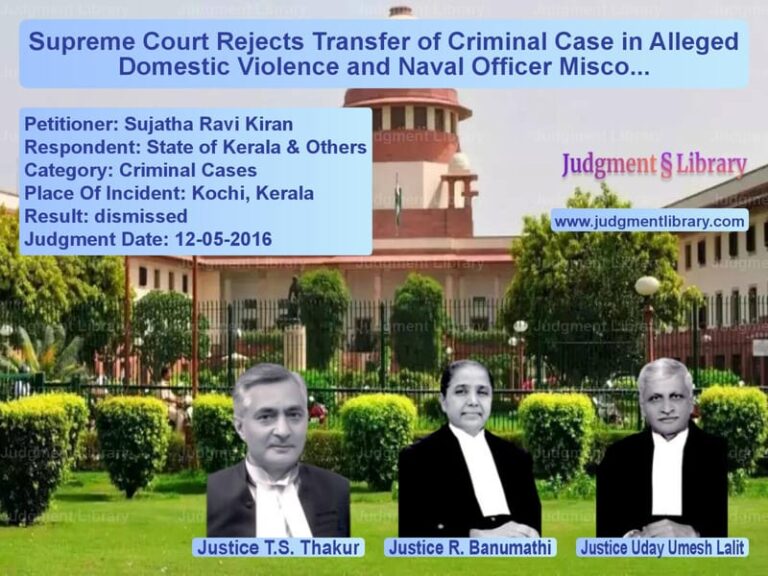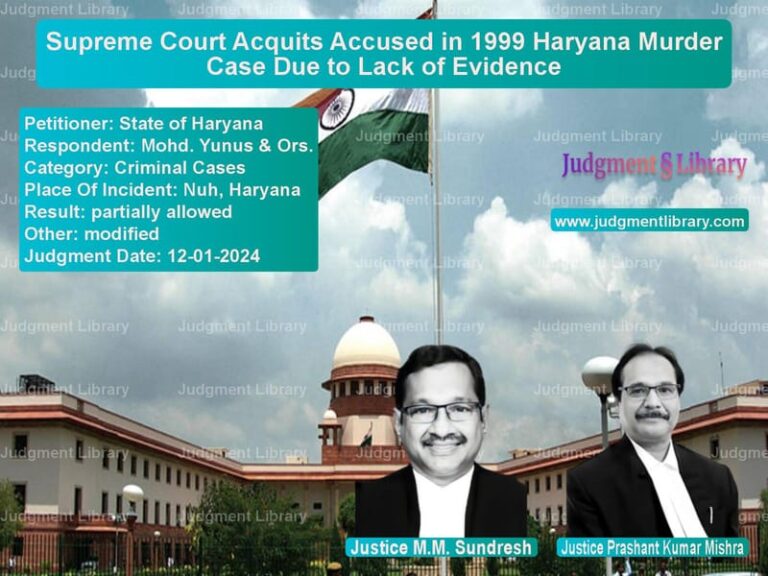Juvenile Justice Act Interpretation in Criminal Cases: Supreme Court’s Detailed Ruling
The case in question revolves around the preliminary assessment of juveniles involved in heinous offenses and whether they should be tried as adults under the Juvenile Justice (Care and Protection of Children) Act, 2015.
The appeals, filed by Barun Chandra Thakur and the Central Bureau of Investigation (CBI), challenged the decision of the Punjab and Haryana High Court that had set aside the orders of the Juvenile Justice Board and the Children’s Court, remanding the matter for fresh consideration.
The case involves an unfortunate incident that took place on 08.09.2017, in a school in Gurugram where a student, referred to as ‘Prince,’ was found in an unconscious state with his throat slit. He was later declared dead. Initially, three suspects were arrested and later released on bail. The CBI took over the investigation and, on 07.11.2017, arrested ‘Bholu,’ a Class XI student, who was 16 years and 5 months old at the time of the incident.
The main legal question was whether the preliminary assessment under Section 15 of the Juvenile Justice Act, 2015, was conducted fairly and in accordance with legal principles. The Juvenile Justice Board had initially determined that the accused should be tried as an adult, a decision upheld by the Children’s Court. However, the High Court found several procedural lapses and remanded the case for fresh consideration.
Petitioner’s Arguments
- The preliminary assessment conducted by the Juvenile Justice Board was flawed as it did not adequately consider the intelligence, maturity, and physical fitness of the juvenile.
- The expert psychologist’s report, relied upon by the Board, was incomplete and conducted using inappropriate tests for the age group.
- The accused was denied access to relevant documents, including the Social Investigation Report (SIR), in violation of principles of natural justice.
- The accused was not given an opportunity to cross-examine the expert witnesses, violating his rights under procedural law.
Respondent’s Arguments
- The law allows children between 16 and 18 years of age, accused of heinous offenses, to be tried as adults after a preliminary assessment.
- The Board had followed the correct procedure by relying on the psychologist’s report, the child’s mental capacity, and his ability to understand the consequences of his actions.
- The confidentiality of documents related to the child’s case, as per Section 99 of the Juvenile Justice Act, justified not providing certain reports to the defense.
- The Board had sufficient material to conclude that the accused had the mental and physical capacity to commit the offense and understand its consequences.
Supreme Court’s Observations
The Supreme Court noted the following critical aspects:
- The preliminary assessment under Section 15 of the Act must consider four essential factors: the child’s mental capacity, physical capacity, ability to understand the consequences of the offense, and the circumstances in which the offense was committed.
- The Board had heavily relied on the psychologist’s report, which only indicated an average IQ of 95 but did not assess the child’s ability to understand the consequences of his actions.
- The psychologist himself had recommended further assessment by a specialized institution, but the Board did not follow this suggestion.
- The respondent (juvenile) was not provided with adequate opportunity to rebut the findings, nor was he given enough time to review critical documents.
- The High Court was correct in remanding the matter for fresh consideration due to procedural lapses.
Supreme Court’s Decision
The Supreme Court upheld the High Court’s decision to remand the case for fresh consideration, stating that:
- The preliminary assessment process should be conducted with greater clarity and fairness.
- The Board must ensure compliance with natural justice by providing all relevant documents and allowing cross-examination of experts.
- Further assessment of the juvenile’s mental capacity should be conducted by a specialized institution if required.
- The Board and Children’s Court should follow proper guidelines in making such assessments, and the government should consider issuing more detailed guidelines to aid in future cases.
Thus, the appeals filed by the complainant and CBI were dismissed, and the matter was sent back for fresh consideration in accordance with the law.
Petitioner Name: Barun Chandra Thakur.Respondent Name: Master Bholu & CBI.Judgment By: Justice Vikram Nath, Justice Dinesh Maheshwari.Place Of Incident: Gurugram.Judgment Date: 12-07-2022.
Don’t miss out on the full details! Download the complete judgment in PDF format below and gain valuable insights instantly!
Download Judgment: barun-chandra-thakur-vs-master-bholu-&-cbi-supreme-court-of-india-judgment-dated-12-07-2022.pdf
Directly Download Judgment: Directly download this Judgment
See all petitions in Juvenile Justice
See all petitions in Bail and Anticipatory Bail
See all petitions in Custodial Deaths and Police Misconduct
See all petitions in Judgment by Vikram Nath
See all petitions in Judgment by Dinesh Maheshwari
See all petitions in dismissed
See all petitions in Remanded
See all petitions in supreme court of India judgments July 2022
See all petitions in 2022 judgments
See all posts in Criminal Cases Category
See all allowed petitions in Criminal Cases Category
See all Dismissed petitions in Criminal Cases Category
See all partially allowed petitions in Criminal Cases Category







